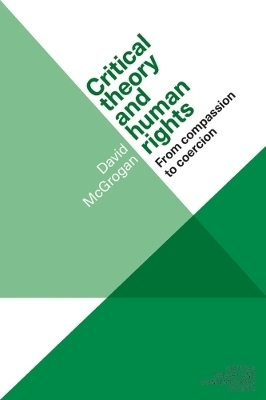
Critical Theory and Human Rights
From Compassion to Coercion
Seiten
2021
Manchester University Press (Verlag)
978-1-5261-3182-9 (ISBN)
Manchester University Press (Verlag)
978-1-5261-3182-9 (ISBN)
This book describes the evolution of the human rights movement into a grand managerial project, rooted in compassion, with the aim of improving universal welfare by defining the conditions of human well-being and imposing obligations on the state and other actors to realise them. It argues that this is ultimately antagonistic to individual freedom. -- .
This book describes how human rights have given rise to a vision of benevolent governance that, if fully realised, would be antithetical to individual freedom. It describes human rights’ evolution into a grand but nebulous project, rooted in compassion, with the overarching aim of improving universal welfare by defining the conditions of human well-being and imposing obligations on the state and other actors to realise them. This gives rise to a form of managerialism, preoccupied with measuring and improving the ‘human rights performance’ of the state, businesses and so on. The ultimate result is the ‘governmentalisation’ of a pastoral form of global human rights governance, in which power is exercised for the general good, moulded by a complex regulatory sphere which shapes the field of action for the individual at every turn. This, unsurprisingly, does not appeal to rights-holders themselves. -- .
This book describes how human rights have given rise to a vision of benevolent governance that, if fully realised, would be antithetical to individual freedom. It describes human rights’ evolution into a grand but nebulous project, rooted in compassion, with the overarching aim of improving universal welfare by defining the conditions of human well-being and imposing obligations on the state and other actors to realise them. This gives rise to a form of managerialism, preoccupied with measuring and improving the ‘human rights performance’ of the state, businesses and so on. The ultimate result is the ‘governmentalisation’ of a pastoral form of global human rights governance, in which power is exercised for the general good, moulded by a complex regulatory sphere which shapes the field of action for the individual at every turn. This, unsurprisingly, does not appeal to rights-holders themselves. -- .
David McGrogan is Associate Professor of Law at Northumbria Law School -- .
Introduction
1 Solipsism and imperialism
2 Between nomos and telos
3 Human rights’ directing idea
4 The governmentalisation of global human rights governance
5 Tactics rather than laws
6 Nothing but rejoicing
Conclusion
Index -- .
| Erscheinungsdatum | 10.05.2021 |
|---|---|
| Reihe/Serie | Critical Theory and Contemporary Society |
| Verlagsort | Manchester |
| Sprache | englisch |
| Maße | 156 x 234 mm |
| Gewicht | 572 g |
| Themenwelt | Recht / Steuern ► EU / Internationales Recht |
| Recht / Steuern ► Öffentliches Recht ► Völkerrecht | |
| Sozialwissenschaften ► Politik / Verwaltung ► Politische Theorie | |
| ISBN-10 | 1-5261-3182-X / 152613182X |
| ISBN-13 | 978-1-5261-3182-9 / 9781526131829 |
| Zustand | Neuware |
| Haben Sie eine Frage zum Produkt? |
Mehr entdecken
aus dem Bereich
aus dem Bereich


